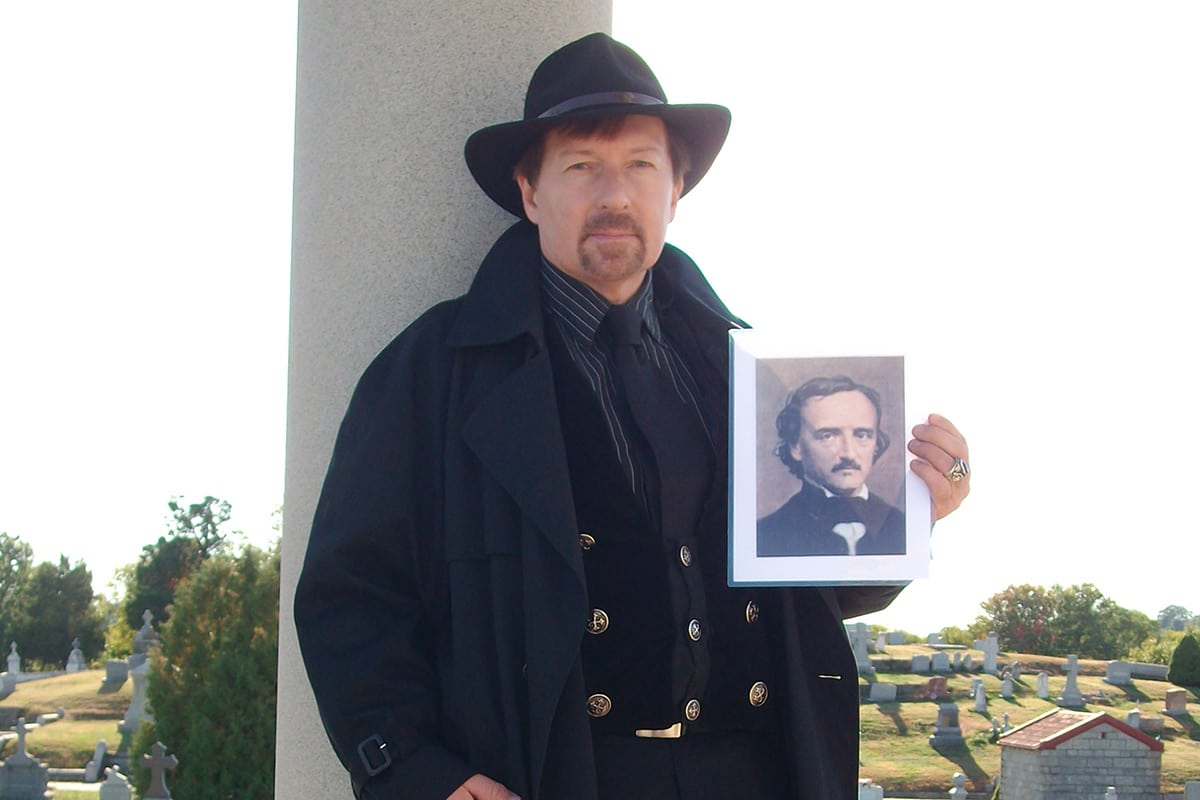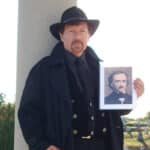Few writers in the annals of popular horror, mystery and suspense literature, past or present, can equal the mystique and renown achieved by American author and poet, Edgar Allan Poe, born on January 19th, 1809 and died October 7th, 1849. Poe is credited with originating the short story format, and inventing the modern detective story. He was the first author to earn a living (albeit, at times, scantily) exclusively from writing. By no means has his popularity diminished over the past 174 years, since his untimely demise at the age of forty. The cause of Poe’s death in Baltimore, Maryland remains uncertain. Indeed, Edgar Poe merited his reputation as a rebel writer, imbued with a darkly poetic spirit.
Misconceptions about Edgar Allan Poe endure. Some of those were sparked by Poe’s first and highly critical biographer Rufus Wilmot Griswold, who even while Poe lived seemed to have a proverbial axe to grind against his subject. He did so effectively, and posthumously, exaggerating Poe’s fondness for liquor and narcotics with a libelous vigor! The image of a homely, rather frail fellow whose facial muscles seemed incapable of raising that black caterpillar of a mustache hung over his lips into a smile, is how most imagine him. Would any think him a handsome and athletic specimen? He was in fact both, especially as a younger man, and undeniably he possessed a measure of personal charm. The trademark mustache was a later affectation he sported only during the last six years of his life. Possessed of a singular appearance, his features bore the stamp of brooding and sorrow, and it seemed the signature of regret pooled in his deep-set eyes. Poe’s expansive forehead, which seems to have accounted for more than half of his face, seemed strangely emblematic of his high intellect and observational powers, perhaps conveying the impression of a mystic Swami and mind-reader.
Edgar Poe did wield a poison pen, attacking fellow writers and literary critics at every turn, himself publishing scathing reviews strewn with slurs. He appeared to cultivate a genuine talent for reversing advantages which came his way. Ralph Waldo Emerson dismissed Poe’s writing style as being shallow and superfluous, dubbing him, “…that jingle man.” However, Edgar Poe did win a measure of literary acclaim, even fame during his lifetime, and was a darling of the lecture circuit. No recordings of his voice exist, of course. Yet it was observed that many admiring persons, fans if you will, women especially, flocked to hear his presentations delivered in darkened rooms.
In his mid-to-later 30s, which was the 1840s Edgar Allan Poe spent some time in his native city of Boston, Massachusetts, and in Providence, Rhode Island during periods in 1848 and ’49, primarily while engaged in a courtship of the eccentric Providence poetess and heiress, Sarah Helen Power Whitman. Poe had been told of the alluring Mrs. Whitman, but his “intel’ was sketchy. He first beheld the widowed Mrs. Whitman one July evening in 1845, while strolling along Benefit Street in the company of his friend Francis Sargent Osgood, whose lecture in Boston he had attended. There, just outside her residence located at the corner of Benefit and Church Streets, Sarah Helen, blond and clad in a diaphanous white nightgown, was tending her rose garden by moonlight. Edgar was instantly smitten but declined an introduction the next day offered by Ms. Osgood, at the time believing the object of his entrancement to be married. Inspired by this vision, Poe wrote his poem, To Helen and sent it to her, anonymously. In fact, prior to their first meeting, Sarah Helen ‘s friend Annie Lynch requested that she write a poem for an 1848 Valentine’s Day party, and Sarah Helen composed a verse she titled, To Edgar Allan Poe. Although Poe himself was not present for the recitation, he did receive a copy of the verse, and he rewrote To Helen. Upon their first in-person meeting, Poe divulged to Sarah Helen that he was indeed the poem’s author.
They quickly grew quite fond of each other, and formed a relationship of mutual admiration which soon blossomed into romance, albeit a tenuous one. Sarah Hellen’s mother, Ann Power, heartily disapproved of their union, but Poe, ever the opportunist and it seemed genuinely enamored, pressed on. When Poe was in Providence, the somewhat mismatched couple would meet clandestinely within the Athenaeum Library along Benefit Street. Eventually, Mr. Power begrudgingly consented to Poe’s requests for the lady’s hand in matrimony, but only on the proviso that upon their wedding, his daughter would be disinherited. In gentlemanly fashion, Poe agreed to this disheartening condition imposed by his prospective father-in-law. The courtship was dissolved after the widowed Mrs. Whitman’s mother hired a detective to trail Poe through his “debauched” wanderings in the streets of Boston and New York, then report E.A.P.’s delinquencies, or so some years later it was related by Rufus Wilmot Griswold. However, Edgar and Sarah remained friends. After Poe’s death, she continued to voice her loyalty and affection for Edgar Poe.
During this period and, as it would be, late in his life, Poe engaged in a series of rather bizarre flirtations, writing love letters to numerous women, some of them quite married. On one trip to Richmond in 1849, he met with his boyhood sweetheart, Elmira Royster, by then widowed, and begged her to marry him. The two seemed to have reached a verbal agreement of sorts when Poe departed, promising to return promptly. He never would.
On September 28th, 1849, after going missing for several days, as it was conjectured, he had boarded a train on his way back to Philadelphia, Poe was found in a gutter outside a Baltimore tavern, unconscious, filthy, and dressed in strange ill-fitting clothes not his own. How he arrived there and that way remains a mystery, although theories of foul play, alcohol poisoning, rabies, and “chicken cooping” have all been proffered. He regained consciousness the next day in Washington College Hospital but was incoherent, trembling and ranting. After a period of violent delirium in which he seemed to fight against ghosts, Poe at last grew calm with exhaustion. Shortly before sunrise on Sunday, October 7th, America’s misfit poet cried weakly, “Lord, help my poor soul!” and died. He was 40 years old. That is the account we have, and probably is closest to the facts. The official cause of his death was listed as, “brain congestion.” He is buried in Baltimore, in the cemetery outside of Westminster Hall, that being his second place of interment, and next to his wife, Virginia.
Through the years, there have been persons who reported seeing the spectral figure of a man resembling Edgar Allan Poe, sitting on the steps of Athenaeum Library, as they drove or strolled by. On at least one occasion, this phantom was heard to speak, reciting lines from Poe’s poem, “The Conqueror Worm.” Was this merely a fanciful Poe impostor, or did a favored few, in the words of H.P. Lovecraft, “espy the shade of Poe?”
In 1978, a letter from Edgar Allan Poe to Sarah Helen Whitman was discovered between the pages of a book on a shelf n the Athenaeum. Evidently, Mrs. Whitman never received it!
On Sunday, October 22nd, 2023, commencing at 2 p.m., an honorarium recognizing the remarkable literary output and abbreviated ‘though extraordinary life (and death) of Edgar Allan Poe will take place in North Burial Ground, located at 5 Branch Avenue, Providence, RI, to be convened by the grave of Sarah Helen Whitman. Recitations of the works of Mr. Poe, plus poetry and song composed for this occasion, will be performed. This event is to be open to free public attendance.









